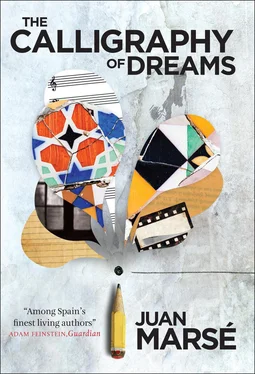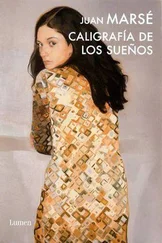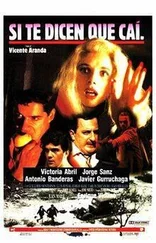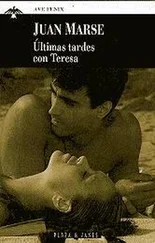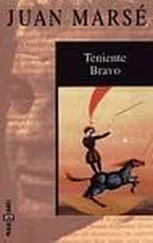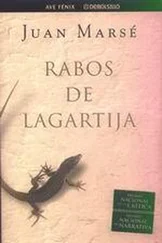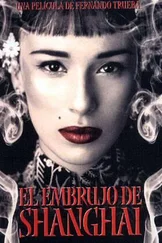“It’s not true,” says Agustín, who is so fat it’s never clear whether he is standing or sitting behind the counter. “No dangerous madman is let loose for good behaviour.”
“He’s been let out with the permission of the military authorities,” comments Señor Carmona from the card-players’ table. “Or of the Falangists. His own people, at any rate.”
“That’s not true either,” says the tavern-keeper, setting up three thick glasses for their coffee and aniseed. “Who can guess the real reason?”
“His own private mental nurse will have done it,” says Señor Rius, dealing the cards slowly and carefully. “As a councillor and cook with the Blue Division, I bet he has his own nurse, and he’s the only one who can give his consent …”
“No, wrong again! The permission and consent came from his wife! That’s obvious!” insists Señor Agustín, serving the card-players their drinks. “And why? Because she thinks her husband is so loopy he no longer has any idea of what’s going on. If not, why would she bring him home, when she’s still hoping her lover boy will put in another appearance again … Have you ever seen a family as crazy as that one, and all because the husband went off to Russia to fight?”
“That’s enough, Agustín, please!” his sister protests. “Poor Vicky. It was her daughter who got him out of there. And you can say what you like, but they have cured him. He doesn’t look the same.”
“I never thought he was completely mad, Paqui,” says Señor Car-mona. “But it’s true, he looks a different person.”
“A different person, my eye!” Señor Agustín explodes. “He’s the same old troublemaker as ever. It’s true he doesn’t go round boasting, or shouting and arguing with people, but he comes in here twice a day demanding his glass of Tío Pepe and pretending he’s somewhere else when it comes to paying. He always used to leave without so much as a thank you, and he wants to do the same now, because of his pretty face and his blue shirt, the scoundrel. He may be another person, but whenever he can he tries to take advantage … Yesterday he came in with the idea he could carry on charging his quota for Social Assistance, and wanted a donation for his youth camps in return for not reporting me for selling Virginia tobacco. The same dirty tricks as when he was a councillor. And I’ve heard he’s been doing the same in other taverns in the neighbourhood.”
Señor Agustín insists that when Mir is speaking directly to you he shows glimpses of the abusive, bossy fellow who was such a pain in the arse, the vestiges of the arrogant attitude many people happily thought was a thing of the past following that pistol shot on the steps of San José de la Montaña, but it seems they were wrong.
“There are still those who look down at the ground when he passes, friends, if you hadn’t noticed. Because crazy or in his right mind, he’s just the same as ever.”
Seeing him walk along the street, slowly and in a pensive mood, or standing at the counter in the Rosales bar, staring at his glass of sherry without showing the slightest interest in the other customers or any desire to talk to anybody, not even to scold the youths rowdily playing table football, he does indeed seem like a new man. His gaze is more troubled, he is much thinner, and he wears loose clothes that aren’t his, a corduroy jacket that looks as if it belongs to somebody else, sometimes with a black beret pulled down over his ears; but what is really new about him is his self-absorbed manner, his slow, unspontaneous gestures, as if he was deciphering what he should do or say in the air. However, as it doesn’t take long to discover, this apparent formality does not prevent him enjoying the fortnight of freedom he has been given, or to surprise everyone with several forays outside his home. He attends services at Las Ánimas, and midnight Mass with his daughter, even the solemn ceremony of the Nativity of the Poor, standing erect at the foot of the altar surrounded by the Congregation of Pious Ladies, and also turns up for the nativity play put on by the church theatre group. But in spite of these regular pious appearances, commented on and celebrated by the faithful, other reports and rumours, even if they are scurrilous bar-room gossip, claim that while the ex-councillor has always been a hypocrite and a Holy Joe he is also a rogue and a womaniser, or to put it more precisely, a shameless whoremonger. A few days before Twelfth Night, there are ribald comments in the Rosales bar to the effect that he was seen in the Quimet on the Rambla del Prat in the company of a tart, with a guitar in his hands, catching the peanuts she was launching towards his mouth. Roger and the eldest of the Cazorla brothers confirm this: they were there and split their sides laughing at his behaviour. The gossip also is that he was seen in Panam’s, a low dive on Las Ramblas, and El Quique — well, El Quique swears he can’t be that off his head, because he has two or three condoms in his pocket, and he’s seen them.
After the Christmas festivities are over, one rainy afternoon Violeta and her father set off down the street under an umbrella to Plaza Rovira, where they wait for a taxi to pass by. That day the ex-councillor really does look like a different person: sad and downcast beneath the umbrella his daughter is holding, with the beret over his eyes and staring obsessively at his hands, he lets her adjust his scarf and do up a button on his raincoat. Shortly afterwards they take a taxi and disappear in the rain towards San Andrés. Three days later, suffering from acute liver pains, Señor Mir is rushed to the Hospital del Mar.
More or less around the same date, exactly three days after he has turned sixteen, one 11 January as night is drawing in, Ringo is reading at his table in the Rosales bar when Roger comes in saying that a woman has been killed in the Delicias cinema. But not in the stalls, the toilets or the foyer: in the projection room. A strange story, the intrigue increasing the more they learn about it. The victim is a prostitute, and was found strangled with a tie on a pile of reels in their cans next to the projector. They say the murderer is the projectionist, and that the police found him in the back row of seats even before the film had finished. Nothing further is known for the moment. The cinema was cleared and sealed off by order of the authorities. El Quique and a kid from his street, who had sneaked into the first afternoon performance, say there was a break in the film that lasted longer than usual. They were showing “La calle sin sol” and “Gilda”, which was interrupted during the scene in the casino when she starts to undo the zip on her dress and says I can never get the hang of zips, but if somebody would like to help me … at which an admirer in the audience shouted that he would be delighted. That was when the film went off, El Quique explained, and added he was already expecting it to, because of course they would cut a film like that, with a gorgeous woman about to be shown stark naked …
Over the next few days more details emerge; the streetwalker was a beautiful Chinese woman, an ex-acrobat and variety artiste, who had once been something more than a friend to ex-councillor Mir, and she wasn’t strangled with a tie but a black stocking.
“With a length of film,” Señor Agustín asserts. “The cashier saw her when she was being carried out. They say it was the murderer himself who called the police, but that after that he had nothing to say, he was in a daze.”
“It seems the victim was wearing her coat, but with nothing underneath,” suggests El Quique.
For a while this is the only subject of conversation in the bar, as everyone speculates about who the victim was, and on the murderer’s motive; whether he killed her out of jealousy, if she lived at the top of Calle Verdi and had a son, that she wasn’t a Chinese tart but was from Aragón, and also that she had often been seen entering or leaving the police station on Calle Travesera. Finally the topic is exhausted, and the lively conversation among the customers turns elsewhere. The same occurs with the gossip about Ramón Mir’s recovered mental health, which is put down to his recent enthusiastic addiction to whoring and living it up. Soon enough, everything slides back into the slime of winter that the days seem to slither along, into the uniform grey that the neighbourhood and the city bear like a stigma, so that it seems yet again that the things that really matter in life must be different, and must take place far from here, far from us. For example, lads: Larry Darrell renounces the beautiful Isabel and heads for the Himalayas in search of the fount of wisdom on a razor’s edge; the young Nick Adams stares at the trout’s fins moving as they struggle against the current of the river with two hearts, Jay Gatsby rows eagerly in his small rowing boat out to a gangster’s luxury yacht, towards a dream that will be his downfall, and Ringo installs himself yet again at his table by the tavern window and watches night close in on the street which, the same as every Sunday at this time, appears suddenly inhospitable and abandoned.
Читать дальше
